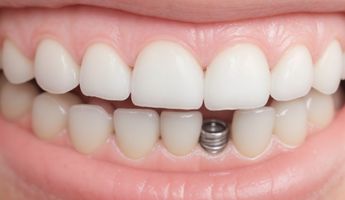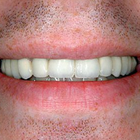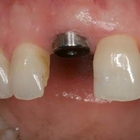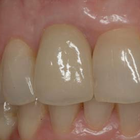Dental Implant in Brazil
Search and Compare the Best Clinics and Doctors at the Lowest Prices for Dental Implant in Brazil

Find the best clinics for Dental Implant in Brazil
With Medijump you can browse 16 facilities offering Dental Implant procedures in Brazil. The cheapest price available is $335 in Rio de Janeiro. And for the cheapest price globally, prices start from $1 in Vietnam.
Dental Implant in Rio de Janeiro
Price: $ 335
Dental Implant in Araraquara
Price: $ 350
Vietnam offers the best prices Worldwide
Price: $ 1
From 12 verified reviews
Otavio Sant Anna, 16 April 2023
Amazing clinic and top notch service. Especially Dr. Andrezza who was very patient with my fear of the dentist. Thank you all and congratulations for the excellent work!
From 4 verified reviews
Rafi Aamer, 23 March 2022
I travelled to Brazil to get the dental treatment done with Dr. Luis Gustavo. The treatment was exceptional and beyond my expectations. The office and the staff not only cared for me in the clinic but outside the clinic as well. I was treated more as a guest than a patient. I am extremely satisfied and would happily recommend the service to everyone.
ZETA Holding (Dentistry and HealthCare), located in Av Pedro Galeazi, Araraquara, Brazil offers patients Dental Implant procedures among its total of 4 available procedures, across 1 different specialties. The cost of a Dental Implant procedure ranges from $350 to $1,000, whilst the national average price is approximately $738. There are many specialists available at the Clinic, with 4 in total, and they are not accredited by any recognized accreditations institutes
Dds Marco Rocha e Carla Simone, located in R Real Grandeza, Rio de Janeiro, Brazil offers patients Dental Implant procedures among its total of 7 available procedures, across 1 different specialties. The cost of a Dental Implant procedure ranges from $800 to $2,000, whilst the national average price is approximately $738. There are many specialists available at the Dental, with 4 in total, and they are not accredited by any recognized accreditations institutes
From 17 verified reviews
Rod Brown, 09 September 2020
I encountered Dr. Rowan Vilar because of a recommendation from a trusted friend. And although both the global pandemic and the impact that had on my very local wallet, prevented me from experiencing treatment under his care ... please allow me a moment to express why he would have been my first choice.I’ve been suffering for about a decade with poor dental health, so much so that the dental professionals in the Atlanta area would not perform regular scheduled maintenance cleanings, for fear of a malpractice suit. I don’t have dental insurance and it has taken years for me to save the money needed to address my oral health.I’ve searched several destinations abroad and even though Dr. Vilar’s wasn’t the least expensive, his review of my current health status and plan to restore me to good health was and remains BY Far, the most comprehensive, the easiest to understand, the most thought out, the most focused on both the physical and mental aspects of oral health, the most attuned to my specific satisfaction and the most considerate of my specific circumstances, that stood as a challenge for me, on the road to alleviating my dental pain and improving my oral health.Here’s how.I contacted his office on a weekend and received a return call before the weekend had ended. We shared 2 or 3 conversations at length, regarding my current status. In those conversations we covered everything from the problems I was experiencing, to how I felt about appearance to what had prevented me from addressing the issues until now.After gathering the information, he expressed a need for X-Rays, Pictures and I also had a topographical CD available. I sent it all to him and we scheduled a follow up ZOOM call for a few days later.I am NOT the most tech savvy senior citizen in the world and Dr. Vilar was very patient with and helpful to me as I struggled via WhatsAPP and ZOOM to connect ... but finally, when I did ... it was So Very Worth My While!Dr. Vilar had prepared a presentation using my photos and that of successful projects he’d previously completed, to detail for me exactly what needed to be done and what I could expect as a finished product. He informed me of the extractions that were needed, those teeth he’d try to save and why ... as well as, the orthodontics and implants that were required to best restore my health. He not only explained what was needed but also why it was important. He addressed the timeline and commitments and was prepared to assist me with finding accommodations during my stay.His English is flawless, pertinent because my Portuguese is non-existent! And, his communication style is very thorough. We’ve interacted for about a month and a half, with him checking in on my progress approximately every two weeks after our initial Zoom consultation before I realized that even though his fees were reasonable, less than half of what I was quoted in the u.S., and despite the fact that his proposed solution was by far the best ... I simply couldn’t afford the best!That said, if I could have ... I most certainly would have. After having searched for nearly a decade and about a dozen countries in both europe and south of the u.S. border, Dr. Vilar’s practice appears to be among the very best on the planet!
From 12 verified reviews
ludmilla maximiuc, 20 September 2020
Melhor botox que já fiz na vida!!!! Super recomendo!!!!A parte de ortodontia infantil tb é maravillosa!! Confiança de olhos fechados!!!!
From 11 verified reviews
Arte dos Marques, 17 June 2019
I was very well attended in my implant procedure and also in other appointments excellent professional support first class. I recommend.
From 3 verified reviews
Marina Freire, 08 September 2020
I would like to thank Dr. Gustavo for his work.I spent a lifetime detesting my smile and now I am very very very satisfied and happy.Thank you!
From 2 verified reviews
Firmino Freitas Reis Filho, 11 September 2019
Excellent professional, very well prepared, very intelligent, kind, polite, attentive. I underwent root canal treatment, very light hand ... it's an 11 note!
From 5 verified reviews
Leide Gallozio, 15 September 2020
Pleasant place, total hygiene and great professional.
From 156 verified reviews
Márcio Kosarczuk Bahy, 20 September 2020
Very friendly hospital.
From 2 verified reviews
Jane Costa, 14 April 2020
I have been a patient of Dr. Adriano for years, an excellent committed and dedicated professional.Even without a plan, he facilitated his consultations, not because he wanted to receive money but always committed to solving my dental problem. I have already seen my son and even an emergency. I recommend
Alexander Hohn, located in R Real Grandeza, Rio de Janeiro, Brazil offers patients Dental Implant procedures among its total of 42 available procedures, across 2 different specialties. The cost of a Dental Implant procedure ranges from $878 to $1,053, whilst the national average price is approximately $738. All procedures and treatments are undertaken by just a small team of specialists, with 2 in total at the Clinic, and they are not accredited by any recognized accreditations institutes
Restaurar Odontologia, located in R Benvinda de Carvalho, Belo Horizonte, Brazil offers patients Dental Implant procedures among its total of 40 available procedures, across 2 different specialties. The cost of a Dental Implant procedure starts from $1,642, whilst the national average price is approximately $738. There are many specialists available at the Clinic, with 8 in total, and they are not accredited by any recognized accreditations institutes
CosmeticVacations, located in R Real Grandeza, Rio de Janeiro, Brazil offers patients Dental Implant procedures among its total of 64 available procedures, across 7 different specialties. Currently, there's no pricing information for Dental Implant procedures at CosmeticVacations, as all prices are available on request only, whilst the national average price is approximately $738. All procedures and treatments are undertaken by the lead specialist at the Hospital, and they have multiple recognized accreditations, including: ASPS - American Society of Plastic SurgeonsSBCP - Sociedade Brasileira de Cirurgia PlásticaSBD - Sociedade Brasileira de DermatologiaSBCD - Sociedade Brasileira de Cirurgia DermatológicaAEXPI - Associação dos Ex-alunos do Professor Ivo PitanguyCBA - Consórcio Brasileiro de AcreditaçãoSBA - Sociedade Brasileira de AnestesiologiaSBCM - Sociedade Brasileira de Cirurgia da MãoSBU - Sociedade Brasileira de Urologia
Grupo Odontológico Floresta, located in Av Pedro Galeazi, Araraquara, Brazil offers patients Dental Implant procedures among its total of 36 available procedures, across 2 different specialties. Currently, there's no pricing information for Dental Implant procedures at Grupo Odontológico Floresta, as all prices are available on request only, whilst the national average price is approximately $738. All procedures and treatments are undertaken by just a small team of specialists, with 2 in total at the Hospital, and they are not accredited by any recognized accreditations institutes
- Home
- Brazil
Compare Before & After Photos of _procedure_photos.phpDental Implant


Front view


Front view


Front view


Front view


Front view
WHY US?
At Medijump, we're making medical easy. You can search, compare, discuss, and book your medical all in one place. We open the door to the best medical providers worldwide, saving you time and energy along the way, and it's all for FREE, no hidden fees, and no price markups guaranteed. So what are you waiting for?

Free

Best Price

Widest Selection

Risk-Free
What you need to know about Dental Implant in Brazil

A dental implant is a medical device that provide support to artificial teeth. It's surgically placed into the jaw to act as a replacement for the root of a missing or damaged tooth, which in turn serves to hold a replacement tooth or bridge. It functions and looks much like a real tooth, restoring your ability to chew and improves your overall appearance. Dental implant surgery is considered as a better alternative to dentures or bridgework that does not fit well. It also offers a great option for people when they do not have enough natural teeth roots left to build denture or bridgework replacements.
Since dental implants eventually fuse with your jawbone over the span of several months, it won’t make noise, slip, or cause bone damage the way dentures or bridgework might. Dental implants also enable natural speech, look and feel like your own teeth, make eating easier, and improves your appearance. However, the surgery may involve several stages, and, in some cases, it may require two separate visits to the clinic to complete. Ensure to look for a specialist in a reputable clinic for the best results.
What is the cost of Dental Implant in Brazil?
Price differences abound in Brazil for Dental Implant based on the clinic, the proficiency of the surgeon, and the individual requirements of the patients. It's essential to realize that dental insurance usually doesn't cover the entire bill for this treatment, though it might cover a part. Several dental clinics provide finance schemes or payment alternatives to assist in easing the financial burden. For more precise cost estimates, reach out to your dental service provider or a nearby clinic.
What does a Dental Implant Procedure Involve?
Dental implant surgery generally requires several stages. Each stage may be performed under general or local anesthetic. The first stage is removing the damaged tooth. Then, if your jawbone is too soft or not thick enough, your dentist may perform bone grafting to create a more solid base for the implant. The bone graft may be natural (taken from another part of your body) or synthetic (a bone-substitute material). If you only need minor bone grafting, the implant surgery can be performed on the same day. However, if you need a significant amount of bone graft, the implant surgery may have to be postponed until the transplanted bone grows enough new bone to support the dental implant.
The next stage after the damaged tooth removal and bone graft (if you need one) is placing the dental implant. To do this, your dentist makes an incision to expose the bone and puts the metal implant post deep into the bone. At this stage, you will still have a gap where your tooth is missing. Your dentist will place a temporary denture for appearance. Once the metal implant post is placed, osseointegration begins. This is a process where the jawbone grows into the surface of the implant and can take several months to complete. After osseointegration is complete, your dentist will place the abutment, which is a small connector post that will hold your new tooth. The final stage, after the abutment is placed, is placing the crown, which is the tooth-looking part. You can choose between a removable crown and a fixed crown.
How Long Should I Stay in Brazil for a Dental Implant Procedure?
The length of your stay in Brazil for a Dental Implant depends on numerous considerations like the intricacies of the procedure, the quantity of implants required, and your personal recovery process. Each stage of dental implant surgery is done in separate appointments. After each appointment, you should be able to leave the hospital or clinic right away. However, you should stay in Brazil for at least 2 weeks for completion of the work, the initial recovery time, and follow-up checkups.
What's the Recovery Time for Dental Implant Procedures?
The recuperation duration following a Dental Implant or dental implant operation can widely vary and is shaped by multiple aspects. Initial healing of the tissue might require only a handful of days, but complete osseointegration (the fusion of the implant with the jawbone) generally spans several months. This window could be extended for patients requiring auxiliary procedures such as bone grafts, or those with prevailing health issues that may impede the healing process.
Post-procedure, it's not unusual to experience a degree of discomfort, which could manifest as minor pain, swelling of your gums and face, skin and gum bruising, and slight bleeding. Such symptoms are a standard phase of the recovery process and should alleviate within a fortnight. In this interim, it's advisable to stick to a soft diet to not overload the implant site with undue pressure. Any strenuous physical exertion should be put off to circumvent potential complications.
Maintaining excellent oral hygiene is paramount to facilitate healing and stave off infection. Regular brushing and flossing, being particularly gentle around the surgical area, coupled with rinsing your oral cavity with warm saline water, can contribute to keeping the region hygienic.
What sort of Aftercare is Required for Dental Implant Procedures?
After each stage of surgery, you may have to eat soft foods. Since you may experience swelling, bruising, pain, and minor bleeding, your dentist will prescribe pain medications or antibiotics to help ease your discomfort. During your recovery period, you need to avoid smoking as it can contribute to implant failure and complications.
No special care is required for dental implants. Nonetheless, you need to practice good oral hygiene in order to maintain the implant and your remaining natural teeth. Make sure to brush your teeth twice a day, floss daily, and rinse your mouth with an antiseptic mouthwash. You also need to see your dentist regularly and avoid damaging habits, such as chewing hard items.
What's the Success Rate of Dental Implant Procedures?
The efficacy of Dental Implant, alternatively referred to as dental implants, in Brazil, is typically impressive, boasting effectiveness percentages as high as 98% in some studies. This positions dental implants as one of the most reliable procedures within dental care's realm. Nevertheless, it's worth mentioning that the success rates might fluctuate, influenced by several factors.
The patient's overall health is a key determinant of the thriving outcome of a dental implant procedure. Individuals exhibiting optimal health usually witness higher success rates. Pre-existing health issues like diabetes, osteoporosis, and periodontal ailments can theoretically impact the efficacy of the implant.
Additional contributing factors to the success rate encompass the quality and abundance of the individual's bone structure. Patients boasting plentiful, healthy bone are ordinarily the perfect candidates for dental implants. However, those who have experienced bone loss might need to undergo a bone grafting procedure before the implant procedure. This step can provide a robust base for the implant and enhance the chances of a successful result.
Are there Alternatives to Dental Implant Procedures?
If you are not a candidate for dental implant surgery, or you simply do not want to undergo the procedure, you can opt for the alternatives. The alternatives include:
- Mini dental implants, which is a small type of dental implants. The structure is similar to regular dental implants, but are somewhat smaller in size. Unlike regular dental implants, dentists can often place mini implants only in one visit using local anesthesia. You may also be able to use your new teeth on the same day.
- A same-day implant is essentially similar to traditional dental implants. However, your dentist performs the whole process in just one day, skipping the process of wound healing and osseointegration.
- Implant-supported dentures or All-on-4 is an alternative if you need to fix a complete upper or lower set of teeth. During this procedure, four to six implants are placed into your jawbone as a base to attach and stabilize your denture.
What Should You Expect Before and After the Dental Implant Procedure?
Grasping what lies ahead before and post the Dental Implant can lessen potential worries and guarantee you are fully equipped for the upcoming journey. Prior to the procedure, your dental practitioner will conduct an all-inclusive dental assessment. This check-up may encompass dental X-rays and sophisticated 3D imaging to examine the status of your oral cavity.
The dental professional will also explore your medical history. If you're suffering from specific heart disorders or orthopedic implants, your dental practitioner might suggest antibiotics to avert infection. A personalized treatment blueprint, customized to your circumstances, will be constructed. This strategy takes into account factors like the amount of teeth you need substituted and the state of your jawbone. The procedure is typically carried out under local anesthesia to mitigate any discomfort.
Subsequent to the operation, experiencing slight unease is usual. You might witness inflammation of your face and gums, discoloration of your skin and gums, soreness at the insertion area, and insignificant bleeding. Your dental specialist will recommend medications to soothe these indicators. In case inflation, unease, or any other complications intensify in the days post-operation, it's crucial to reach out to your oral surgeon. Post-operation will require you to consume mushy foods as the operated site recovers. Moreover, you'll be guided to abstain from smoking, as it can hinder recovery and influence the triumph of the dental implant.
Following the positioning of the implant, the healing process, and fusion with the bone (osseointegration) transpire over an extended period. During this interval, maintaining robust oral cleanliness is vital. This involves frequent brushing, the use of dental floss, and cleansing with an antibacterial mouthwash. Periodic dental examinations are obligatory to track progress and confirm the well-being and effectiveness of the implant.
What are Potential Risks of Dental Implant?
Despite Dental Implant boasting remarkable effectiveness, it is, as any surgical operation, not without risks and potential difficulties. The chances of encountering these issues are often minute and irregularities are infrequent, yet it remains critical for patients to comprehend these possibilities before undertaking the procedure.
Complications and side effects may include:
- Implant failure
- Nerve injury
- Infection
- Sinus problems
- Damage to surrounding structures, such as other teeth or blood vessels
How long does a Dental Implant last?
The durability of a Dental Implant is heavily reliant on the individual's oral cleanliness and general wellbeing. Nonetheless, with appropriate upkeep and care, dental implants have the potential to stand the test of time. The titanium pillar inserted into the jawbone during surgery is crafted to be everlasting, while the dental cap fastened to the anchor may necessitate substitution every decade or decade and a half due to normal usage. Yet, with outstanding dental management and habitual screenings, the cap has the potential for lifelong endurance.
Whilst the information presented here has been accurately sourced and verified by a medical professional for its accuracy, it is still advised to consult with your doctor before pursuing a medical treatment at one of the listed medical providers
No Time?
Tell us what you're looking for and we'll reachout to the top clinics all at once
Enquire Now

Popular Procedures in Brazil
Prices Start From $1

Prices Start From $1

Prices Start From $48

Prices Start From $1

Prices Start From $1

Prices Start From $11

Prices Start From $1

Prices Start From $45

Recommended Medical Centers in Brazil for Dental Implant

- Interpreter services
- Translation service
- Religious facilities
- Medical records transfer
- Medical travel insurance
- Health insurance coordination
- TV in the room
- Safe in the room
- Phone in the room
- Private rooms for patients available

- Interpreter services
- Translation service
- Religious facilities
- Medical records transfer
- Medical travel insurance
- Health insurance coordination
- TV in the room
- Safe in the room
- Phone in the room
- Private rooms for patients available

- Interpreter services
- Translation service
- Religious facilities
- Medical records transfer
- Medical travel insurance
- Health insurance coordination
- TV in the room
- Safe in the room
- Phone in the room
- Private rooms for patients available

- Interpreter services
- Translation service
- Religious facilities
- Medical records transfer
- Medical travel insurance
- Health insurance coordination
- TV in the room
- Safe in the room
- Phone in the room
- Private rooms for patients available

- Interpreter services
- Translation service
- Religious facilities
- Medical records transfer
- Medical travel insurance
- Health insurance coordination
- TV in the room
- Safe in the room
- Phone in the room
- Private rooms for patients available

- Interpreter services
- Translation service
- Religious facilities
- Medical records transfer
- Medical travel insurance
- Health insurance coordination
- TV in the room
- Safe in the room
- Phone in the room
- Private rooms for patients available

- Interpreter services
- Translation service
- Religious facilities
- Medical records transfer
- Medical travel insurance
- Health insurance coordination
- TV in the room
- Safe in the room
- Phone in the room
- Private rooms for patients available

- Interpreter services
- Translation service
- Religious facilities
- Medical records transfer
- Medical travel insurance
- Health insurance coordination
- TV in the room
- Safe in the room
- Phone in the room
- Private rooms for patients available

- Interpreter services
- Translation service
- Religious facilities
- Medical records transfer
- Medical travel insurance
- Health insurance coordination
- TV in the room
- Safe in the room
- Phone in the room
- Private rooms for patients available

- Interpreter services
- Translation service
- Religious facilities
- Medical records transfer
- Medical travel insurance
- Health insurance coordination
- TV in the room
- Safe in the room
- Phone in the room
- Private rooms for patients available
Dental Implant in and around Brazil
About Brazil
Occupying the title of the largest country in South America, Brazil embraces a diverse population of over 209 million people. The nation is globally renowned for its passion for football (also referred to as soccer in some parts of the world) and their dynamic, flamboyant carnival traditions, boasting a vibrant mix of music, dance, and colorful attire.
In addition to its vivacious culture, Brazil is a sanctuary of spectacular natural beauty. The country nurtures some of the world's most stunning natural wonders, including the dramatic Iguacu Falls and the world's largest tropical rainforest, the Amazon Rainforest, teeming with diverse plant and animal species. One can't miss the landmark figurine of Christ the Redeemer in Rio de Janeiro that towers 98-feet high, becoming a symbol of Brazil's deep-rooted religious faith and an iconic sight that captures hearts worldwide.
Brazil offers more than 60 JCI-accredited facilities and is one of the leading destinations in the world for cosmetic surgery, with Dental Implant procedures being especially popular. Doctors are often Western-trained and speak English on top of Portuguese and Spanish. Local accreditations include the Consortium of Brazilian Accreditation and the Brazilian Hospital Medical Quality Organization (ONA). Popular locations within Brazil include the capital Brasilia, Rio de Janeiro, Sao Paulo, and Curitiba.
Popular Parts of Brazil
- Rio de Janeiro is a combination of natural attractions and metropolis. It is known to be a party city that offers good times and an unforgettable experience. Lounge around in the world-famous beaches of Ipanema and Copacabana, sample Brazilian cuisine, hike the summit of Corcovado and see the high statue of Christ the Redeemer, dance in Rio Carnival, and see the spectacular views of Ipanema and Guanabara Bay from the Sugarloaf Mountain.
- São Paulo is the largest city in Brazil. It is a huge city that at first glance seems intimidating. It offers hundreds of museums, quirky urban art, delicious cuisine, lively nightlife, and intense cultural experience. Visit Avenida Paulista (Paulista Avenue), a street filled with shopping centers, parks, bars, restaurants, museums, theatres, and cultural spaces.
- Salvador is full of vibrant cultures. It is the heart of Brazil’s Afro-Brazilian community. The city’s charm lies in its pastel-colored neighborhood, centuries-old architecture, and freshly-cooked acarajé and completed with wild festivals and capoeira circles every night.
- Brasília is Brazil’s capital. It’s very modern with futuristic architecture that looks more like artworks than ordinary buildings. It’s a paradise for architecture buffs. Besides the architecture, the food and nightlife in this city is something that should not be missed.
- Manaus might be isolated in terms of location, but it’s actually a large city with a prospering industry and a rich culture. The city is also filled with natural beauty; green spaces, waterfalls, and ecological parks surround its colonial buildings. It is the gateway to the Amazon Rainforest.
Weather and Climate in Brazil
As a large country, the weather in Brazil varies from tropical in the north to temperate in the south. A large part of the country lies in the topics. Brazil is a year-round destination because it has a steady average annual temperature. The temperature rarely drops below 20 °C.
Winter in Brazil starts in May and ends in September. The weather remains tropical in the north with an average temperature ranging between 20 °C to 30 °C. In Rio de Janeiro, the temperature varies between 14 °C to 25 °C. However, the evenings usually feel a lot colder.
During this particular season, one can expect a fair amount of rainfall in Rio, leading to many wet and rain-soaked days. If you plan a visit at this time, it's wise to keep that in mind and prepare accordingly. In contrast, further inland, São Paulo experiences significantly cooler temperatures compared to Rio, reflecting the country's vast geographical expanse and diverse microclimates spread across its regions.
This temperature drop might require some warm clothing, especially during late evenings and nights. So, whether you wish to enjoy the rainy murmur in Rio or seek the cool retreat of São Paulo, there's something unique for every traveler in Brazil during this season.
The temperature in Rio rise between November and March, with the highest temperature of around 40 °C but with a thermal sensation of around 50 °C. The Rain rarely lasts long during these months. In the north of Brazil, the rainy season starts in December. March and May see the heaviest rainfall. It’s hot and humid with frequent rain throughout the year in the Amazon.
Getting Around in Brazil
The most popular international airports are Rio de Janeiro–Antonio Carlos Jobim International Airport (popularly known as Galeão International Airport) and São Paulo/Guarulhos–Governador André Franco Montoro International Airport. Both airports serve domestic and international flights to many cities around the globe. The airports mainly serve major airlines but there are budget airlines such as Norwegian Air UK. Tourists can take taxis, bus, train, or car rental from both airports to the city centers.
Brazil is really big, so there will be a lot of long-distance travel to get around the country. The easiest and fastest way to get from one city to another is by domestic flights. The only downside is that the tickets are very expensive. LATAM and GOL Airlines offer multi-trip tickets or air pass. The most economical option is to buy an air pass if you plan to visit a number of different cities.
Buses are popular in Brazil, servicing most areas of the country. The bus system is excellent and provides a comfortable and economical way of travel. Be aware that the distance can be really tiring and overwhelming; some trips can take over 40 hours. The buses are operated by hundreds of different private companies, but the price is standardized. The fare varies from 75 BRL to 240 BRL. There are luxurious buses too.
A good way to get around major cities like São Paulo and Rio is to use Brazil Metro (subway). The fares are around 3.50 BRL to 3.80 BRL. You can purchase rechargeable travel cards. The metro does not operate at night. Be sure to watch your belongings at all times when traveling on the metro.
Taxis run on a metered system, but if you travel a bit further out of town, you need to negotiate the price with the driver. It is best to phone for a taxi or pick one up at a taxi station and make sure to get into a licensed taxi. Ferries and other water travel are important in many parts of Brazil.
Tourist Visas in Brazil
Nationals of 72 countries and territories can enter and stay in Brazil for up to 90 days without a visa. In some cases, an identity document may be accepted instead of a passport. Citizens of other countries, including China and India, must apply for and obtain a visa before entering Brazil. It is recommended to contact the nearest Brazilian embassy or consulate for the most up-to-date visa information.
Brazil offers an electronic visa (e-Visa) for citizens of eligible countries. The e-Visa is valid for two years and allows multiple entries for stays of up to 90 days per year. Applicants can apply for the e-Visa online through the Brazilian government's website.
Additional Information
- Local Currency: The official currency is the Brazilian Real (BRL). 1 USD will get you approximately 5.04 BRL.
- Money & Payments: ATMs are widely available in Brazil and it is the easiest way of getting cash in big cities. ATMs in smaller towns usually don’t work for non-Brazilian cards. Credit cards (Visa and MasterCard) are accepted in numerous shops, restaurants, and hotels. It might be handy to always have cash with you, but always be extremely cautious. Tipping is optional for housekeepers, tip parking assistants 2 BRL, or more since they do not receive wages and depend on tips. Taxis do not expect tips. Restaurants usually include a 10% service charge in the bill.
- Local Language: The official language is Portuguese. English is not widely spoken, especially outside Rio and São Paulo.
- Local Culture and Religion: The largest religion in Brazil is Christianity with more than 60% of the population follows Roman Catholicism.
- Public Holidays: Brazil celebrates major Christian religious holidays as well as Independence Day and Civil Servants Day. Festa Junina, Parintins Folklore Festival, and Oktoberfest are three of the biggest annual festival in the country.
Popular Searches
- Plastic Surgery in Thailand
- Dental Implants in Thailand
- Hair Transplant in Thailand
- Breast Augmentation Thailand
- Gastric Sleeve in Thailand
- Gender Reassignment Surgery in Thailand
- Laser Hair Removal in Bangkok
- Botox in Bangkok
- Dermatology in Bangkok
- Breast Augmentation in Bangkok
- Coolsculpting in Bangkok
- Veneers in Turkey
- Hair Transplant in Turkey
- Rhinoplasty in Turkey
- Stem Cell Therapy in Mexico
- Rhinoplasty in Mexico
- Liposuction in Mexico
- Coolsculpting in Tijuana
- Rhinoplasty in Korea
- Scar Removal in Korea
- Gastric Sleeve in Turkey
- Bone Marrow Transplant in India
- Invisalign in Malaysia
- Plastic Surgery in the Dominican Republic
- Tummy Tuck in the Dominican Republic
- Plastic and Cosmetic Surgery in Poland
- Rhinoplasty in Poland
- Hair Implant in Poland
- Dental Implants in Poland
- IVF in Turkey














